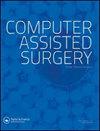一种应用于引导技术的腰椎椎弓根螺钉放置优化方法
IF 1.9
4区 医学
Q3 SURGERY
引用次数: 10
摘要
椎弓根螺钉是脊柱节段性固定的常用方法。为了追求高精度和微创性,各种不同的制导技术得到了发展。然而,术前螺钉位置方案均为人工选择,操作复杂,耗时长。此外,目前的路径规划只考虑了位置,没有考虑术后螺钉的留位。为了解决这一问题,提出了一种自动规划腰椎椎弓根螺钉置入的新方法。首先,基于现有的椎体分割技术,识别椎弓根区域并建立初始路径;然后,通过改进的边界受限Nelder-Mead单纯形算法对路径进行优化,得到理论上最优的坚定度路径。我们综合考虑了术后螺钉位置的准确性和牢固性,实现了全自动的最优路径规划,可以有效地辅助操作人员,提高螺钉置入的牢固性。本文章由计算机程序翻译,如有差异,请以英文原文为准。
A method of lumbar pedicle screw placement optimization applied to guidance techniques
Abstract Pedicle screws are an established method for spinal segmental fixation. To pursue high accuracy and minimally invasive, various different guidance techniques have developed. However, the preoperative screw position plans are determined by manual selection which demands complex operations and costs a lot of time. In addition, the current paths planning only consider the position, without taking the postoperative screws retention into consideration. In order to solve the problems, a new method was proposed to plan the lumbar pedicle screw placement automatically. Firstly, identify pedicle area and establish initial path based on the current vertebrae segmentation technology. After that, optimize path via the improved boundary limited Nelder–Mead simplex algorithm, and get the highest firmness path in theory. We considered that both the accuracy of position and the firmness of postoperative screws, achieved a fully automatic optimal path planning, which can effectively assist operators, improve the firmness of screw placement.
求助全文
通过发布文献求助,成功后即可免费获取论文全文。
去求助
来源期刊

Computer Assisted Surgery
Medicine-Surgery
CiteScore
2.30
自引率
0.00%
发文量
13
审稿时长
10 weeks
期刊介绍:
omputer Assisted Surgery aims to improve patient care by advancing the utilization of computers during treatment; to evaluate the benefits and risks associated with the integration of advanced digital technologies into surgical practice; to disseminate clinical and basic research relevant to stereotactic surgery, minimal access surgery, endoscopy, and surgical robotics; to encourage interdisciplinary collaboration between engineers and physicians in developing new concepts and applications; to educate clinicians about the principles and techniques of computer assisted surgery and therapeutics; and to serve the international scientific community as a medium for the transfer of new information relating to theory, research, and practice in biomedical imaging and the surgical specialties.
The scope of Computer Assisted Surgery encompasses all fields within surgery, as well as biomedical imaging and instrumentation, and digital technology employed as an adjunct to imaging in diagnosis, therapeutics, and surgery. Topics featured include frameless as well as conventional stereotactic procedures, surgery guided by intraoperative ultrasound or magnetic resonance imaging, image guided focused irradiation, robotic surgery, and any therapeutic interventions performed with the use of digital imaging technology.
 求助内容:
求助内容: 应助结果提醒方式:
应助结果提醒方式:


